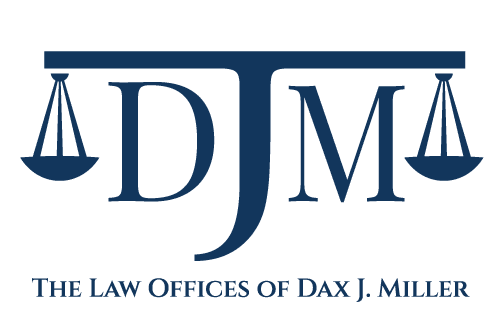Chapter 13 Bankruptcy is commonly known as reorganization bankruptcy. People may use this to stop repossession or prevent foreclosure. If you have a sale date on a home, this may stop a foreclosure sale date. Chapter 13 Bankruptcy may allow you to reorganize unsecured debt like credit cards, medical bills, collection accounts, payday loans, and online loans. In some cases, it may also allow you to reorganize tax debt, student loans, child support or alimony.
Contact The Law Offices of Dax J. Miller Today For A Free Consultation. We file lost bankruptcies for $0.00 down so that you can get the protection that you need now.
At The Law Offices of Dax J. Miller, our Indiana bankruptcy attorney will personally discuss your situation with you during your free consultation to determine how Chapter 13 Bankruptcy can serve you and your family. It generally may also look better on your credit to future lenders. Think about it — if you were a bank and were reviewing two customers for a loan, one who paid money back and one who didn’t, who would you rather do business with?
Indiana Chapter 13 Bankruptcy Process
A typical Chapter 13 Bankruptcy generally proceeds like this:
- Call the Law Offices of Dax J. Miller for a free phone or in-office consultation to determine if it is best for you.
- Come to our office where we will draft your bankruptcy petition right in front of you. There are no tedious forms or questionnaires for you to fill out. You are paying for an attorney’s attention and that is what you get.
- We then file your case which creates a federal injunction against the collection of most types of debts. This usually stops all debt collection phone calls, collection letters, negative reporting to your credit and most lawsuits although some exceptions may apply.
- In the case of Chapter 13 bankruptcy, the federal injunction may also stop garnishments, vehicle repossessions, and foreclosure on your home.
- Your bankruptcy attorney then files a Plan of Reorganization. This Plan tells the Bankruptcy Court how much you intend to pay to your creditors and which creditors get paid before others. This plan may last anywhere from 36 months (three years) to 60 months (five years). The duration of your plan depends largely on your income level and your specific goals.
- Approximately one month after filing, you will have a hearing that you attend with us. There is no judge and no jury. It is not even in a courtroom and most hearings last less than five minutes. This is where the Chapter 13 Bankruptcy Trustee comments on your plan regarding whether he or she will recommend approval to the court.
- Assuming the Chapter 13 Bankruptcy Trustee has no major concerns with your plan, approval will be recommended to the judge.
Completing your Indiana Chapter 13 Bankruptcy
- You will then make your regular monthly payments to the Indiana Chapter 13 Bankruptcy Trustee until you have completed your plan.
- When your plan is completed, you may receive a Chapter 13 Bankruptcy discharge. The Chapter 13 Bankruptcy discharge generally encompasses more categories of debts than a simple Chapter 7 Bankruptcy. The dischargeability of these debts vary from case to case. Make sure to consult with an experienced Indiana bankruptcy attorney so that your Chapter 13 Bankruptcy maximizes the amount of debt you can discharge.
- Generally speaking, most clients receive solicitations from banks to start new credit cards or finance vehicles immediately after receiving a discharge. We always warn clients to view these offers with caution because you do not want to end right back up in debt.
- If you are in the market for a new home and do not have a 20% down payment, you actually have greater options during and after a Chapter 13 Bankruptcy than you do with Chapter 7 Bankruptcy. With Chapter 7 Bankruptcy, you must wait two years from the date of discharge to qualify for the FHA home loan. However, the FHA program then requires you only put down 3.5%!
- With Chapter 13 Bankruptcy, the FHA is much more lenient and they typically consider the following elements:
- • the one year of the pay-out period under the bankruptcy has passed,
- • the borrower’s payment history reflects timely payments, and
- • the borrower has received written permission from Bankruptcy Court and Chapter 13 Trustee to enter into a new mortgage.
- A major misconception people have about bankruptcy is that they have to wait many years before you can even use credit again. That is completely false. The truth is that you can start rebuilding right away.
- If you have questions about your Chapter 13 Bankruptcy options, contact The Law Offices of Dax J. Miller today for a free consultation!
We file most Chapter 13 Bankruptcies for $0.00 down so that you can get the protection that you need now.
Chapter 13 Bankruptcy May Stop Repossession
If you file Chapter 13 Bankruptcy in Indiana, it may allow you to prevent your vehicle or vehicles from being repossessed. Chapter 13 Bankruptcy may even allow you to pay a much lower interest rate. More importantly, if you purchased your vehicle more than 2.49 years ago (910 days), then you may likely be able to pay simply what your car is worth through your Chapter 13 Bankruptcy as opposed to what you actually owe. This is called cram down.
Chapter 13 Bankruptcy May Stop Foreclosure or Even Allow Loan Modification
If you file Chapter 13 Bankruptcy in Indiana, it may allow you to prevent your house or investment property from being foreclosed on. The Bankruptcy Code generally allows one to save their homestead property as long as they can afford to do so. If it is an investment property, then as long as the property is profitable, it may also be saved too.
Chapter 13 Bankruptcy to Reorganize Tax Debt or Student Loan Debt
If you file Chapter 13 Bankruptcy in Indiana, it may allow you to legally restructure your IRS tax debt or your student loans. Exceptions certainly apply but if you are struggling with tax debt or student loans, Chapter 13 Bankruptcy may be a good solution to your problem.
Take Control Now
Your debt is the problem. The Law Offices of Dax J. Miller may be your solution. We offer UNLIMITED FREE consultations to ensure that you are comfortable and confident in your financial future. More importantly, we are LOCAL.



